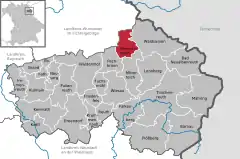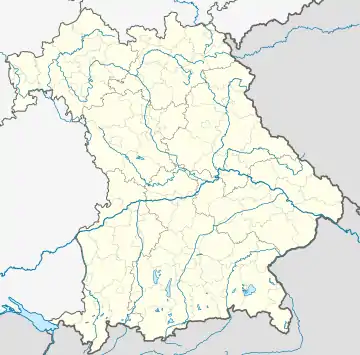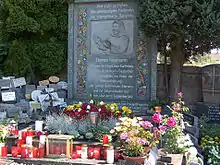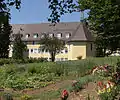Konnersreuth
Konnersreuth is a municipality in the district of Tirschenreuth in Bavaria, Germany. It is situated in the northeast foothills of the Steinwald mountains between the Fichtel Mountains and the Upper Palatinate Forest, close to the Czech border. The village is best known as the home of the 20th-century Catholic stigmatist Therese Neumann.[3]
Konnersreuth | |
|---|---|
 Coat of arms | |
Location of Konnersreuth within Tirschenreuth district  | |
 Konnersreuth  Konnersreuth | |
| Coordinates: 50°1′N 12°14′E | |
| Country | Germany |
| State | Bavaria |
| Admin. region | Oberpfalz |
| District | Tirschenreuth |
| Subdivisions | 9 Ortsteile |
| Government | |
| • Mayor (2020–26) | Maximilian Bindl[1] |
| Area | |
| • Total | 23.32 km2 (9.00 sq mi) |
| Elevation | 573 m (1,880 ft) |
| Population (2022-12-31)[2] | |
| • Total | 1,725 |
| • Density | 74/km2 (190/sq mi) |
| Time zone | UTC+01:00 (CET) |
| • Summer (DST) | UTC+02:00 (CEST) |
| Postal codes | 95692 |
| Dialling codes | 09632 |
| Vehicle registration | TIR |
| Website | www.konnersreuth.de |
History
The historical record first mentions Konnersreuth in 1218, in a chronicle kept at Waldsassen Abbey. In 1468 the village was granted the right to hold regular markets.[4] In 1780, the population was 954.
The market rights were held by Waldsassen Abbey until about 1803, when the monastery holdings were secularized.[5] The present municipal boundaries were set in the 1818 Bavarian administrative reforms.
The coat of arms was awarded in 1468.[6] Three green fir trees stand on a silver background behind a leaping red deer. The coat of arms was renewed in 1978. [7]
Therese Neumann
In the early 20th century, Konnersreuth was the home of the stigmatist Therese Neumann (Resl of Konnersreuth).[8] After a supposedly miraculous healing from partial paralysis while in her twenties, Therese Neumann reportedly developed stigmata on her hands, feet and side and every Friday for years, and relived the passion of Christ in visions.[9] She also purportedly abstained from food for 40 years.[10] The village is still a Catholic pilgrimage centre with two abbeys: the Oblates of St. Francis de Sales at Fockenfeld and the Carmelite abbey of Theresianum.[11]
Economics and demographics
In 1999, the municipality contained 51 farms with a total farmed area of 1395 hectares. There are also small businesses in the town, and some residents work in forestry.
As of 2009, the village had 1915 residents.[12] There are three schools: a kindergarten with (in 1999) 79 pupils, an elementary school with (in 1999) 162 students and a private high school for boys located in Fockenfeld Abbey with (in 1999), 58 students.
Notable people
- Therese Neumann (1898–1962) Resl of Konnersreuth
- Dietmar Hamann (born 1973) (football player and coach
- Cardinal Aloys Grillmeier (1910–1998), Catholic theologian
Gallery
 House where Therese Neumann was born
House where Therese Neumann was born Grave of Therese Neumann
Grave of Therese Neumann Theresianum Abbey
Theresianum Abbey View of Konnersreuth
View of Konnersreuth
References
- Liste der ersten Bürgermeister/Oberbürgermeister in kreisangehörigen Gemeinden, Bayerisches Landesamt für Statistik, 15 July 2021.
- Genesis Online-Datenbank des Bayerischen Landesamtes für Statistik Tabelle 12411-003r Fortschreibung des Bevölkerungsstandes: Gemeinden, Stichtag (Einwohnerzahlen auf Grundlage des Zensus 2011)
- konnersreuth.de ("Weltbekannt wurde Konnersreuth durch die stigmatisierte Therese Neumann (1898–1962), deren Leben und Wirken noch heute den Ort prägen."), home page in May, 2011
- Bavaria: bd., 1. abth. Oberpfalz und Regensburg By J. Heyberger, Christian Schmitt, August Wilhelm von Wachter. Cotta, 1863.
- The History of the Monastery of Waldsassen ("Monastic activities ended in 1803 due to secularisation "), May 2011
- Heraldry of the World ("The arms were granted in 1468 by Nicolaus, Abbott of the Waldsassen Abbey "), May 2011
- "Konnersreuth". memim.com. Retrieved 12 July 2016.
- Das Fichtelgebirge Sagenhaft Archived 2011-01-03 at the Wayback Machine ("Weltbekannt wurde Konnersreuth durch die Ereignisse um die stigmatisierte Therese Neumann. Zwei bedeutende Klostergründungen entstanden durch die Initiative der "Resl von Konnersreuth"."), May 2011
- Who's who in Christianity By Lavinia Cohn-Sherbok, Routledge, 1998.
- Who's who in Christianity By Lavinia Cohn-Sherbok, Routledge, 1998.
- konnersreuth.de ("Ihrer Initiative verdankt Konnersreuth das Klostergut Fockenfeld und das Kloster Theresianium. Das Geburtshaus, der Garten und das Grab der Resl sind neben der herrlich renovierten Rokoko-Pfarrkirche besondere religiöse Anziehungspunkte."), home page in May, 2011
- Statistisches Bundesamt Deutschland – Online Abfrage, May 2011